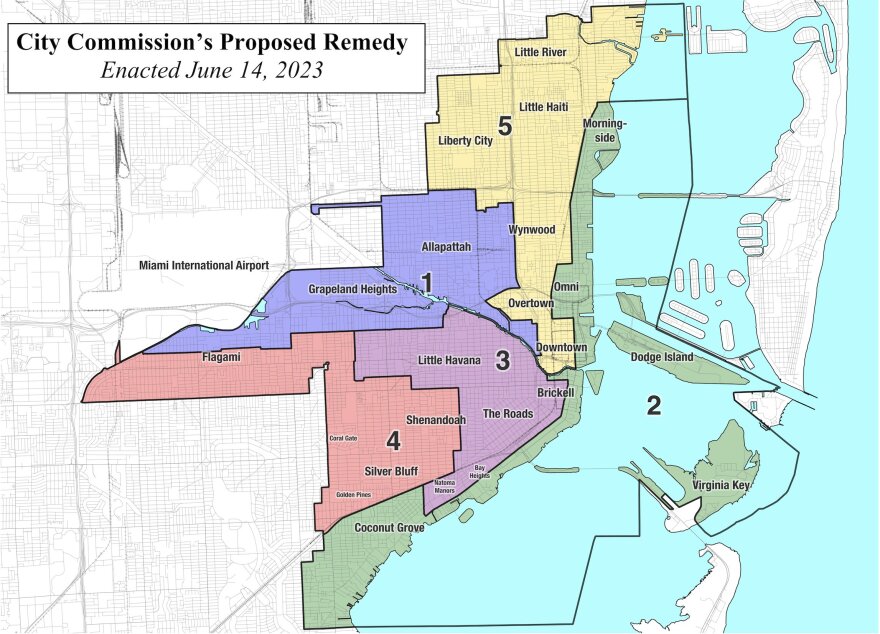This story was updated at 6:05 p.m.
The U.S. Supreme Court has ruled: Miami will use a contentious map drawn up by city commissioners in this November's election.
In a Thursday evening ruling, the full court denied a request from community activist groups led by the ACLU of Florida who have been battling with the city since last December. The groups wanted Miami to use a map of their creation for the election, because they consider the city's map unconstitutional.
The court gave a flat denial of the group's request, with no written opinion.
The groups sued the city last year, accusing them of racially gerrymandering the voting map by maintaining a “Black district” and three “Hispanic districts.” A federal judge agreed with the groups and ordered the city to adopt a map drawn by the plaintiffs.
The city appealed the decision, arguing that the elections in November would come too soon to implement a new map, and won in the federal appeals court.
READ MORE: Miami commission approves new map, but activists say they will try to block it
It led the groups to make a last-ditch attempt, asking the highest court in the land to vacate the appeals court's decision. Their request was directed specifically to Justice Clarence Thomas, who oversees the 11th District, which includes Florida. Thomas then referred the request to the full court.

With the Supreme Court’s decision, the appeals court’s ruling now stands.
"The City of Miami is gratified that our City map is now settled for the 2023 fall election," the City said in a written statement following the ruling. "The City will continue to work on behalf of all residents to provide district maps that are fair, equitable and representative and in line with all legal requirements."
Daniella Pierre, a president of the NAACP's Miami-Dade branch, one of the groups involved in the lawsuit, said the ruling is a blow to Miami residents.
"The Court’s ruling is extremely disappointing and disheartening. This decision takes the power and voices away from the residents of Miami. Fair and equal representation is a right, and our communities should be electing who represents them," Pierre said in a written statement.
The Miami-Dade County Elections Department had already been doing preparation work with both the city’s and the plaintiffs’ maps while the court was deliberating on the issue.
Prior to the court's ruling, Miami-Dade County Supervisor of Elections Christina White said the county was hoping for a swift decision, as voter information cards for Miami residents were being delayed.
"The Elections Department has started to disseminate new voter information cards to registered voters in Miami-Dade County. Distribution for the City of Miami is currently on hold as we await a response from the Supreme Court. We hope for a swift decision in an effort to plan for Miami’s November 7th Municipal Election," White said in a statement to WLRN on Wednesday.
The community groups’ lawsuit against the city is still expected to go to jury trial in 2024, regardless of the recent ruling.
"The fight is not over," Carrie McNamara, staff attorney with the ACLU of Florida, wrote in the plaintiffs' statement. "While we are disappointed in this decision, it only impacts the November 2023 municipal election. We look forward to proving our case at trial in January so that Miamians will be able to live in fair districts starting in 2025."
The appeals court's decision had rested solely on the fact that it did not want to change the city's map so close to an election. It did not rule on whether or not the city had actually racially gerrymandered city districts.
A jury will decide next year if Miami commissioners were in fact guilty of racially gerrymandering, as the community groups allege.






